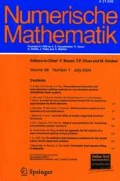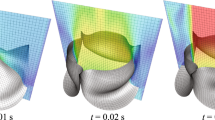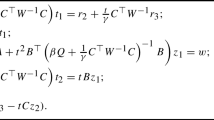Summary.
In this paper, we consider some nonlinear inexact Uzawa methods for iteratively solving linear saddle-point problems. By means of a new technique, we first give an essential improvement on the convergence results of Bramble-Paschiak-Vassilev for a known nonlinear inexact Uzawa algorithm. Then we propose two new algorithms, which can be viewed as a combination of the known nonlinear inexact Uzawa method with the classical steepest descent method and conjugate gradient method respectively. The two new algorithms converge under very practical conditions and do not require any apriori estimates on the minimal and maximal eigenvalues of the preconditioned systems involved, including the preconditioned Schur complement. Numerical results of the algorithms applied for the Stokes problem and a purely linear system of algebraic equations are presented to show the efficiency of the algorithms.
Similar content being viewed by others
Author information
Authors and Affiliations
Additional information
Received December 8, 1999 / Revised version received September 8, 2001 / Published online March 8, 2002
RID="*"
ID="*" The work of this author was partially supported by a grant from The Institute of Mathematical Sciences, CUHK
RID="**"
ID="**" The work of this author was partially supported by Hong Kong RGC Grants CUHK 4292/00P and CUHK 4244/01P
Rights and permissions
About this article
Cite this article
Hu, Q., Zou, J. Two new variants of nonlinear inexact Uzawa algorithms for saddle-point problems. Numer. Math. 93, 333–359 (2002). https://doi.org/10.1007/s002110100386
Issue Date:
DOI: https://doi.org/10.1007/s002110100386




